|
|
|
Sort Order |
|
|
|
Items / Page
|
|
|
|
|
|
|
| Srl | Item |
| 1 |
ID:
141111
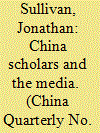

|
|
|
|
|
| Summary/Abstract |
Public interest in China, as reflected in the level of media attention, is burgeoning in the West and elsewhere in the world. This interest is driven by China's increasing presence and importance in the lives of people around the world; and for the same reason is likely to continue growing. Since media discourses are the main way in which Western publics receive information about China, contributing to media reports and helping journalists reach deeper understandings is an important task and opportunity for academics whose specialist knowledge of China is often more nuanced than that of generalist China correspondents. Although developments in the two professions are demanding closer and more frequent interactions, many scholars are reluctant to engage. This is partly due to structural disincentives within the academy, and partly due to obstacles in the scholar–media relationship. Focusing on the latter, the objective of this article is to illuminate how China scholars and journalists currently interact, and to identify means to increasing their efficiency and sustainability.
|
|
|
|
|
|
|
|
|
|
|
|
|
|
|
|
| 2 |
ID:
141102
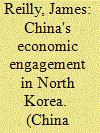

|
|
|
|
|
| Summary/Abstract |
Since 2005, central Chinese leaders have successfully encouraged local governments and commercial actors to expand their economic interactions with North Korea. However, the resulting expansion in commercial actors and economic interactions has intensified a principal-agent dilemma for Chinese leaders, exacerbating diplomatic tensions, eroding border security, and undermining popular support for Beijing's engagement strategy. In comparison with China's other neighbours, North Korea presents both a difficult case for stimulating economic engagement and a relatively easy case for enforcement. These dynamics are even more likely to emerge across China's 13 other land neighbours.
|
|
|
|
|
|
|
|
|
|
|
|
|
|
|
|
| 3 |
ID:
141109
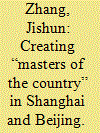

|
|
|
|
|
| Summary/Abstract |
The first round of elections for local people's congresses was an important moment in the Chinese Communist Party's efforts to create an image of the common people as the “masters of the country.” Lower-class people were portrayed in official propaganda as “masters” who were also supporters of the Party. Yet, those “masters” nevertheless displayed diverse political attitudes that were influenced by different local political cultures, particularly in Beijing and Shanghai. The official propaganda promoting the “masters” was a Communist strategy to gain political legitimacy that ironically created the foundation for heterodox mass movements.
|
|
|
|
|
|
|
|
|
|
|
|
|
|
|
|
| 4 |
ID:
141110


|
|
|
|
|
| Summary/Abstract |
The Nanjing Incident of late March 1976 was a precursor of, and according to some analysts a trigger for, the more famous Tiananmen Square demonstrations of 4–5 April. The two protests have widely been interpreted as spontaneous outpourings of dissent from Cultural Revolution radicalism, expressed through mourning for the recently deceased premier, Zhou Enlai. A closer look at the background to these demonstrations in Nanjing reveals that the protests there occurred in the midst of, and in response to, a vigorous public offensive by former leaders of rebel factions to overthrow civilian cadres for reversing Cultural Revolution policies. The outpouring of respect for Zhou – and criticism of Politburo radicals – mobilized enormous numbers of ordinary citizens onto the city streets, far larger numbers than the rebel leaders were able to muster. This demonstrated the disappearance of the popular support rebel leaders had briefly enjoyed a decade before. While the Nanjing protests were unanticipated by either the rebel leaders or the Party officials they sought to overthrow, they were only the latest in a series of local political confrontations.
|
|
|
|
|
|
|
|
|
|
|
|
|
|
|
|
| 5 |
ID:
141108
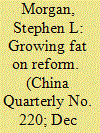

|
|
|
|
|
| Summary/Abstract |
Economic growth over the past three decades has greatly improved the nutrition and living standards of people in China. However, increasingly, the Chinese are becoming heavier. As many as a quarter of Chinese school-age urban boys are overweight or obese, yet a third of Chinese children remain underweight. Drawing on six national surveys of children's health conducted since 1979, the article reports on trends in nutritional status and regional disparities. It shows that the drivers behind the increase in mean body mass and in nutritional inequality are associated with rising household incomes and associated inequalities between provinces.
|
|
|
|
|
|
|
|
|
|
|
|
|
|
|
|
| 6 |
ID:
141106
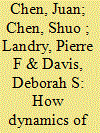

|
|
|
|
|
| Summary/Abstract |
Using a 2011 national survey of urban residents, irrespective of their official hukou status, and the 2000–2009 night-time light data from the Defense Meteorological Satellite Program Operational Linescan System (DMSP-OLS), this paper goes beyond the simple dichotomy of migrant versus non-migrant or rural versus urban hukou to disentangle the processes of urbanization and migration and their complex associations with health, and assesses the impact of various levels and speed of urbanization on the physical and mental health of current residents in a city or town. By disaggregating urbanization into three discrete dimensions at sub-provincial levels, we find that while a higher absolute level of urbanization at the county level negatively impacted self-reported physical health, faster and accelerating urbanization had a positive impact which could be attributed to the demand-pull effect underlying the healthy migrant phenomenon. By contrast, all three dimensions of urbanization were associated with greater depressive distress and thus had an adverse effect on residents' mental health. Beyond demonstrating how variation in the process and location of urbanization affects individual health, we also illustrate more broadly the value of modelling locational parameters in analyses of individual outcomes based on national samples.
|
|
|
|
|
|
|
|
|
|
|
|
|
|
|
|
| 7 |
ID:
141103
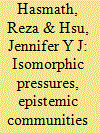

|
|
|
|
|
| Summary/Abstract |
This article suggests that the lack of meaningful collaboration between the state and NGOs in China is not solely a result of the state seeking to restrict the development of the sector, or the fear of a potential opposing actor to the state; instead, interviews with NGOs in Beijing and Shanghai suggest that a lack of meaningful engagement between the state and NGOs can be partially attributed to isomorphic pressures within state–NGO relations, and insufficient epistemic awareness of NGO activities on the part of the state. In fact, the evidence suggests that once epistemic awareness is achieved by the state, it will have a stronger desire to interact with NGOs – with the caveat that the state will seek to utilize the material power of NGOs, rather than their symbolic, interpretive or geographical capital.
|
|
|
|
|
|
|
|
|
|
|
|
|
|
|
|
| 8 |
ID:
141104
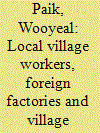

|
|
|
|
|
| Summary/Abstract |
In market reform China, contentious and unfair labour relations between vulnerable migrant workers and exploitative foreign factory owners are one of the most critical issues of the political economy. This article analyses another group of workers – non-migrant local village workers – who protect themselves from foreign employers using two political resources: collective land-use rights and local political organizations, such as village governments, affective networks and physical forces, during their suburban village's industrialization. Based on intensive ethnographic fieldwork in Shandong (Qingdao) and other coastal regions in 2007, 2008 and 2011–2013, this article attempts to answer the questions of how local village workers protect their labour rights without reliable trade unions or rigorous governmental protection. How can villagers protect, if not maximize, their interests in their relations with the foreign factories in their villages? It also contrasts local labour relations in Qingdao with migrant labour relations in other coastal regions.
|
|
|
|
|
|
|
|
|
|
|
|
|
|
|
|
| 9 |
ID:
141112


|
|
|
|
|
| Summary/Abstract |
In this commentary on the research note by Wang Xiaobing, Chengfang Liu, Linxiu Zhang, Yaojiang Shi and Scott Rozelle, “College is a rich, Han, urban, male club: research notes from a census survey of four tier one colleges in China,” I address several caveats in using the relative disparity index in assessing the extent of inequality in access to higher education. Based on these discussions, I point out the potential limitations existing in the empirical study of Wang and colleagues, and reassess the extent of disparity in college education opportunities in contemporary China using data from the 2010 Chinese General Social Survey. Although the descriptive patterns consolidate the study of Wang and colleagues, only household registration status is significantly associated with the likelihood of attending college. These findings indicate that disparities per gender, economic status, and ethnicity based on a limited number of colleges are likely to be subject to sampling errors. Finally, no interaction effects between socio-demographic factors are detected. I offer some reflections on the disproportionality approach in the research of education inequality.
|
|
|
|
|
|
|
|
|
|
|
|
|
|
|
|
| 10 |
ID:
141107


|
|
|
|
|
| Summary/Abstract |
The People's Republic of China failed to win the hearts and minds of the Hong Kong Chinese people before its resumption of the city's sovereignty on 1 July 1997. This article attempts to account for this contradiction in China's pursuit of reunification. By shifting the focus to the alternative battle to control the lives and bodies of the local population, this article demonstrates how China exploited its water and food supplies to the colony in order to control Hong Kong before and after 1997. The study pinpoints the bio-political measures used by China to secure Chinese sovereignty over Hong Kong. It concludes with an analysis of the current situation in Hong Kong and the implications of China's control of water and food supplies for the relations between the ruling state and the people of Hong Kong.
|
|
|
|
|
|
|
|
|
|
|
|
|
|
|
|
| 11 |
ID:
141105


|
|
|
|
|
| Summary/Abstract |
Using a household sample survey for 2006, this article shows that the Hui population in the rural part of Ningxia Autonomous Region in China is disadvantaged compared to the Han majority as regards length of education and household per capita wealth. Yet, there is no gap in average disposable incomes between the two ethnic groups and poverty rates are very similar. This paradox is owing to members of Hui households earning more off-farm income than members of Han households. In particular, young Hui males living in poor villages have a remarkably high likelihood of migrating, thereby bringing back income to their households.
|
|
|
|
|
|
|
|
|
|
|
|
|
|
|
|
|
|
|
|
|